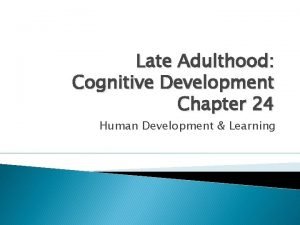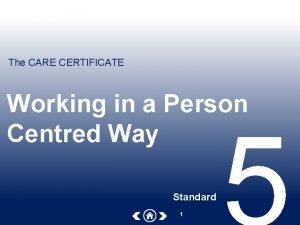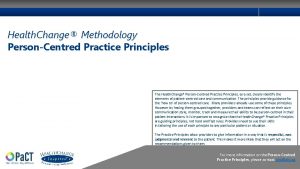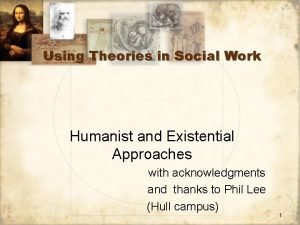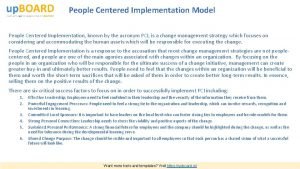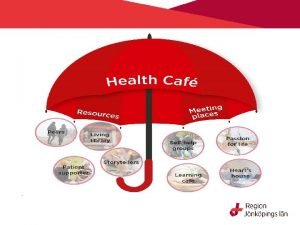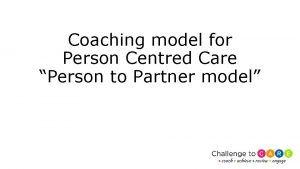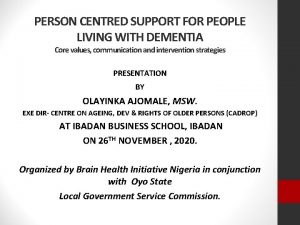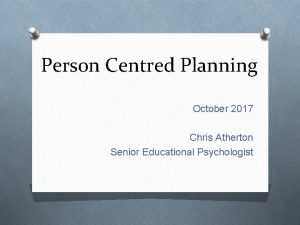PERSON CENTRED PLANNING WITH OLDER PEOPLE WITH INTELLECTUAL









- Slides: 9

PERSON CENTRED PLANNING WITH OLDER PEOPLE WITH INTELLECTUAL DISABILITY (ID)

Aims of the Module 1. To transmit the basics of the person centred approach to caring for older people with ID, mainly addressing approach, tools and methods. This is to achieve the first steps to a change of attitudes of professionals and front-line staff in supporting older people with ID. 2. To change the professional‘s and front-line staff‘s view of a person with intellectual disability and increase their involvement related to the rights of older people with ID. 3. Awareness of the carers to optimize the participation and self-determination of elderly people in daily life. 4. To improve knowledge of the tools of person centred planning an how to apply these in practice. 5. To learn how to cope with specific issues related to older people with ID such as retirement, new activities, death, grief, disease, illness, last wills….

Learning Outcomes and Competencies Learning Outcomes • Knowledge of the difference between traditional provision of services and person centred planning • Knowledge of the main principles and key features of the person centred planning approach. Competencies § Ability to achieve first steps to a change of our attitude towards the support of older people with ID in a person centred way. § Ability to apply techniques to gather biographical information on an elderly person. • Knowledge of how to use different tools of the person centered life planning and thinking. • Knowledge about the importance of PCP for handling transitions in a biographical approach. • Knowledge how to use basic tools for Person centred thinking and planning. • Knowledge of specific methods and aspects to consider when working with old people with ID and dementia. • Ability to transmit the person centred approach in the support of older persons with ID, Person is in the center of the care planning. • Knowledge about basic attitudes that underline the work with old people with ID and about respect, openness and empathy required when in contact with a person with ID. • To appropriate basic attitudes in the support of older clients. Being aware to reflect the support regularly. • Being able to cope with aged related specific themes such as death, grief, fear of dying in the support of older people.

Structure of the Module Introduction I. Introduction to Person Cenred Planning II. The relevance of PCP for Elderly People with ID III Person Centred approach and attitudes Summary • Overview and structure of the Module • Aims of the Module • Outcomes Objectives & Practical Competencies • Glossary of important terms • Premodule awareness exercise • A short history of Person centred planning • Definition and key features of PCP • A story of friendship • PCP and transitions • Case vignette : Peter • Summary • Overview • Biographical Work with oler people, important aspects, Life Story Books • Person Centred Thinking and Planning • Tools for good support • Personal futur planning • Speciifique elements to consider when person centred working with people with ID and dementia • Exercises and quiz • summary • Openess towards a Person with ID • The Willingness to explore instead of Judging the Behaviour • Empathy • Respect of the Uniqueness of People with ID • Respect for the specific aspects of Coping of a person with ID • Case vignettes – Attiudes towards people with ID • Dealing with old age • Dealing with dying and fear of death • Dealing with grief • Exercises and Summary • Summary of the Module • Further Resources • Self-Test

Topic 1 – Introduction to Person Centred Planning Based on case vignettes and exercises in this section you will receive insights in to the following topics : Ø Introduction of the person centred planninng § § Traditional provision of services The history of person centred planning Ø Key features in the person centred planning Ø PCP is a useful approach for handling important transitions in our life illustrated by a case vignette of Peter

Topic 2 – The Relevance of Person Centred Planning for Older People with Intellectual Disability Ø Biographical work with older people with ID § important aspects § life story books Ø Different tools in person centred thinking and planning „important to“ and „important for“ a person § one page profile § Ø Person centred future planning : the role of a circle of support Ø Person centred care planning : a model of good support for people with dementia (Kitwood) § personhood § important elements : inclusion, care, identity, occupation, attachment.

TOPIC 3 – Person Centred Approach and Staff Attitudes Ø Whatever technical skills we have, our attitude towards a person with ID is the BASE or our approach. The third topis deals with basic attitudes underlying our work : § Openness § Willingness to explore instead of judgment § Respect for the uniqueness of a person § Respect for specific aspects of coping of a person with ID § Empathy Ø Case vignettes : Video Roleplaying with an actor § Dealing with old age § Dealing with dying and fear of death § Dealing with grief

Strengths of the Module Ø Original The method to explain the person centred approach, thinking and future planning trough the module Ø Related to practice Acquaintance of different tools of the PCP, the care givers have the opportunity to test this tools starting from their own environment and work field Ø Visualization Using Video role-playing to demonstrate how to apply basic attitudes in various situations in the support of older people

Thank you! Please submit the module presentation as a. pptx file to Daniela Janeva (agid@agid-project. eu) and Andreas Kocman (andreas. kocman@univie. ac. at)
 Life is older older than the trees
Life is older older than the trees Late adulthood mental development
Late adulthood mental development Work in a person centred way care certificate
Work in a person centred way care certificate Health change methodology
Health change methodology Person-centred approach
Person-centred approach Existentialism examples
Existentialism examples Person-centred approach
Person-centred approach Who traditional medicine strategy: 2014-2023
Who traditional medicine strategy: 2014-2023 People centred implementation
People centred implementation Höflichkeitsform plural
Höflichkeitsform plural

